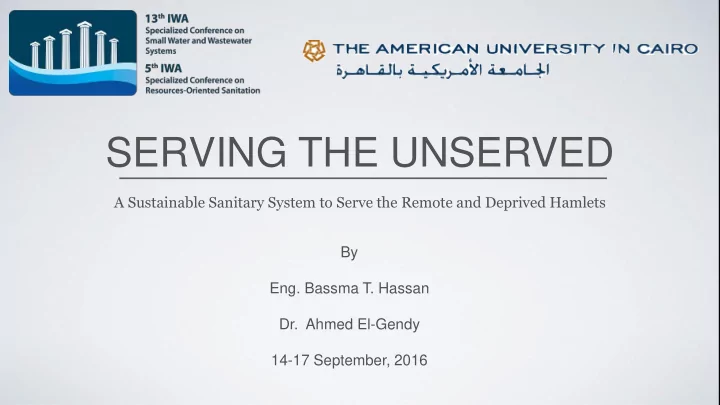

SERVING THE UNSERVED A Sustainable Sanitary System to Serve the Remote and Deprived Hamlets By Eng. Bassma T. Hassan Dr. Ahmed El-Gendy 14-17 September, 2016
Outline 1) Introduction 2) Problem Identification 3) Solution Design 1 st Solution 1) 2 nd Solution 2) 4) Conclusion 5) Recommendation
INTRODUCTION • Focusing on Hamlets - less than 5000 capita- Introduction • 3170 Village & 26,540 hamlets without proper wastewater system Problem 50,000,000 Identification 26.540 People 30000 Sol. Design 2 nd 1 st Solutio Solutio 22500 n n Conclusion 15000 Recommendation 3.170 7500 106 1.023 136 480 Non Served 0 Progressing Served Villages Hamlets
Problem Identification • Centralized System • High Cost Erection and Maintenance Introduction • Less beneficiaries Problem Hamlet Identification • Lack of Skilled Labor • Open Disposal Trenches Sol. Design 2 nd • 1 st Energy Shortage • Contaminate and increase groundwater table x Solutio Solutio n n Village Hamlet • Threats health and surrounding environment Conclusion Hamlet Recommendation Treatment Plant Hamlet
Design of small scale and Sewage Collection system for Hamlets in Egypt
DESIGN REQUIREMENTS • Cost Effective Introduction Problem Identification • Low Energy Consumption Sol. Design 2 nd 1 st • Sustainable System and Environmentally Friendly Solutio Solutio n n Conclusion • Low Maintenance Recommendation
PROTOTYPE HAMLET • Al Gozaira, Ismalia Governorate Introduction • Surrounded Two Water Bodies Problem • Al Rayah Drain Identification Sol. Design • Irrigation Tertiary Canal 2 nd 1 st Soluti Solutio • Current Population 1,138 Capita n on Conclusion • Total Area 100,000 m2 Recommendation • Normal Growth Rate 3.5% • Sewage Flow is 85 l/c/d
Tackling The Problem • Adequate Systems 1. Conventional System Introduction Problem 2. Shallow System Identification Sol. Design 3. Septic Tank 2 nd 1 st Solutio Solutio n n Decentralized System Conclusion Recommendation Hybrid system Combination of Septic Tanks and between conventional OR Shallow System and Shallow System
SOLUTION DESIGN CRITERIA Conventional Alternative Solution Criteria Shallow System System With Septic Tank Pipes Alignment Middle of the street Middle of the Street Middle of the Street Min. Street Width More than 3 m Less than 3 m Any Min. Diameter 200 mm 150 mm 50 mm Min. Cover 1 m 0.5 m 0.5 m Min. Slope 3.25 m/km 3.5 m/km 0 m/km Min. Velocity 0.6 m/s 0.6 m/s - Max.Velocity 2.5 m/s 2.5 m/s 2.5 m/s Inspection Chamber and Pipes Connection Manhole Inspection Chamber Inspection Ports
1st Solution: Combination between Shallow system and Conventional System Conventional Shallow Criteria System System Introduction Min. Street Width < 3 m > 3 m Min. Diameter 200 mm 150 mm Problem Identification Min. Cover 1 m 0.45 m Min. Slope 3.25 m/km 3.5 m/km Sol. Design Min. Velocity 0.6 m/s 0.6 m/s 2 nd 1 st Max.Velocity 2.5 m/s 2.5 m/s Solutio Solutio n n Conclusion Recommendation Shallow System Conventional System
1st Solution: Combination between Shallow system and Conventional System Diameter 150 mm for the shallow & 200 mm for the s conventional 0.5 to 1.5 in Shallow & 1 m to 5 m for Introduction Covers Conventional Problem Velociti 0.29 m/s to 0.91 m/s in all the system Identification es Sol. Design Slopes 5 to 20 m/km 2 nd 1 st Solutio Solutio n n Conclusion Recommendation Shallow System Conventional System
2nd Solution: Combination of Septic Tanks and Shallow System Conventional Shallow Criteria System System Min. Street Width Any > 3 m Introduction Min. Diameter 50 mm 150 mm Problem Min. Cover 0.5 m 0.45 m Identification Min. Slope 0 m/km 3.5 m/km Sol. Design Min. Velocity - 0.6 m/s 2 nd 1 st Max.Velocity 2.5 m/s 2.5 m/s Solutio Solutio n n Conclusion 150 mm for the shallow & 50, 100 & 150 mm for Diameter s Septic Recommendation Covers 0.5 to 1.5 m in the shallow and 1 to 3.5 m in the Septic Velocitie 0.3 m/s to 1.95 m/s in all the system s Slopes 3.25 to 20 m/km Shallow System 50 – 100 – 150 mm
COST ANALYSIS Solution 1 - Shallow and Conventional System Name Quantity Unit Cost Cost 150 mm Pipes 581 m EGP400.00 EGP232,400.00 200 mm pipe 2279 m EGP500.00 EGP1,139,500.00 Introduction Inspection 28 EGP800.00 EGP22,400.00 Chamber Problem Manholes 75 EGP3,000.00 EGP225,000.00 Identification Drop Manholes 9 EGP5,600.00 EGP50,400.00 Sol. Design 2008 m 2 Excavation EGP19.00 EGP38,152.00 30% 2 nd 1 st Total Cost EGP1,707,852.00 Solutio Solutio Solution 2 - Alternative System n n Name Quantity Unit Cost Cost Conclusion 50 mm Pipes 946 m EGP200.00 EGP189,200 Recommendation 100 mm pipe 405 m EGP300.00 EGP121,500 150 mm pipe 1470 m EGP400.00 EGP588,000.00 Septic Tanks 13 EGP16,023.00 EGP208,299.00 Inspection 122 EGP800.00 EGP97,600.00 Chamber Inspection Ports 17 EGP300 EGP5,100 Excavation 1718 EGP19.00 EGP32,642.00 Total Cost EGP1,242,341.00
CONCLUSION 2 nd solution is Efficient and Effective solution for hamlets in Egypt, due to: Introduction • Cost Effective Problem • Low Energy Consumption Identification Sol. Design • Gravity Sewer 2 nd 1 st • Sustainable System and Environmentally Friendly Solutio Solutio n n • Effluent Reuse in Agriculture as fertilizers Conclusion • Low Maintenance Recommendation • Septic Tank de-suldged every 6 month to two years
Introduction Recommendation Problem Identification Sol. Design • The System should be applied to solve the lack of sanitation 2 nd 1 st in small communities Solutio Solutio n n • One person costs around EUR 40 - 80 and can be served up Conclusion to 10 years at least Recommendation
Acknowledgment • The American University in Cairo • Water Resources Research Institute • Dr. Tarek Sabry • Dr. Emad Hamdy Imam • Eng. Sara Alaa • Eng. Shereen Helal • Eng. Meriam Melad
Thank you Any Questions?
Recommend
More recommend